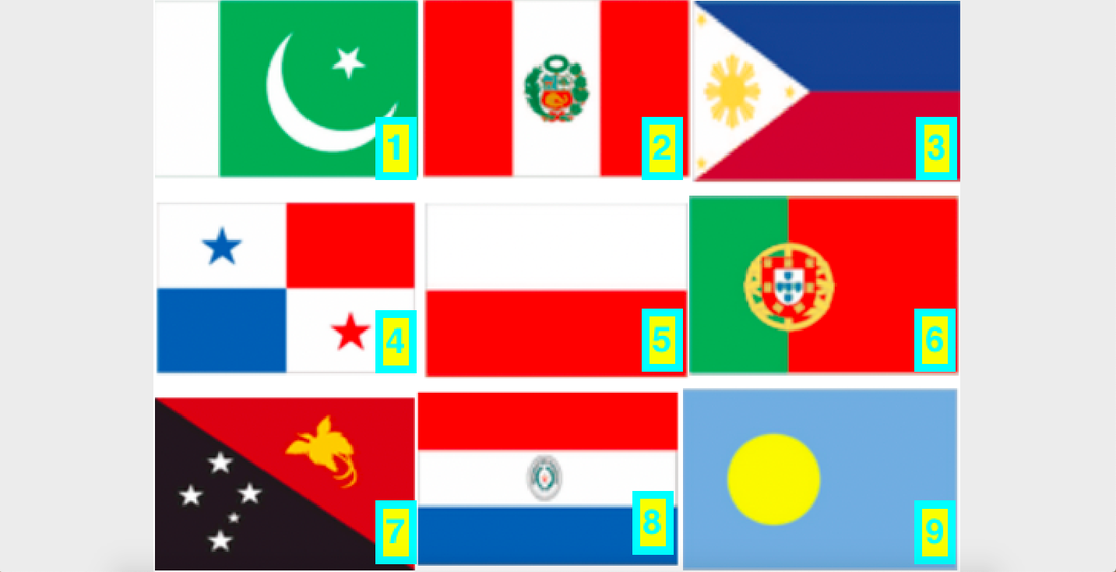| |
| |
| |
| Presented By Brilliant |
| |
| Axios World |
| By Dave Lawler · Apr 10, 2023 |
| Welcome back to Axios World. - In tonight's edition (1,652 words, 6 minutes) we visit Bangkok and Belfast, count Bengali tigers and flip through textbooks.
Heads up: If you're in Oxford, U.K., Axios is coming to you this Wednesday for an event at the Skoll World Forum on tackling global challenges like access to clean water and health care. Register here to attend. |
| |
| |
| 1 big thing: Generals vs. democrats in Thailand's election |
 |
|
| Paetongtarn Shinawatra arrives at a campaign rally last week. Photo: Jack Taylor/AFP via Getty Images |
| |
| Thailand's May 14 election pits Prime Minister Prayuth Chan-ocha and the military establishment against the youthful scion of the country's most famous political dynasty, Paetongtarn Shinawatra. Why it matters: Thailand has been in quasi-democratic limbo since 2019 when Prayuth was elected after stacking the deck in his own favor while leading a military junta. Since then, Thailand has seen dramatic protests and Prayuth's approval ratings have plummeted. - While next month's vote will be "fundamentally flawed," according to Human Rights Watch, the outcome is highly uncertain.
- It could determine whether the Southeast Asian state, where the U.S. and China have been competing for influence, moves toward or away from democracy.
Flashback: In 2006, Thailand's coup-prone military removed Paetongtarn's father, Thaksin Shinawatra, a telecom tycoon and Thailand's most popular leader in recent history. - In 2014, Gen. Prayuth led the junta that dissolved a government led by Paetongtarn's aunt, Yingluck Shinawatra.
- The junta pushed through a new constitution that forces any new government to gain a majority of all legislators, including the elected lower house and an appointed upper house packed with military allies.
- Any government without military backing needs the support of up to 75% of elected legislators — an incredibly high bar for Paetongtarn's Pheu Thai and other opposition parties.
Yes, but: Polls suggest they might have a genuine shot at clearing it. - A poll last month from the National Institute of Development Association put Pheu Thai at 50% and another progressive party, Move Forward, at 17%. Prayuth's United Thai Nation had 12%.
- Just 36, Paetongtarn marks a sharp contrast with the 69-year-old Prayuth.
- Assuming her father's mantle of "economic populism," Paetongtarn has promised to double the minimum wage.
The big picture: These are the first elections since massive youth-led protests began in 2020 calling for reform of the constitution, the military and even the monarchy — unheard of in a country where strict lèse-majesté laws mean insulting the king can result in jail time. - Pheu Thai has backed some of the protesters' demands, such as revising the constitution, but not the calls to reform lèse-majesté.
- It's a delicate balancing act. The predecessor party to Move Forward was disbanded in 2020, nominally for campaign finance violations, after daring to question the power of both the military and the monarchy.
Breaking it down: "Backroom dealmaking" will likely trump the ballot box in deciding who governs Thailand, according to an analysis from the ISEAS - Yusof Ishak Institute. - An opposition landslide big enough to overcome the Senate's opposition and sweep Pheu Thai into power is possible but unlikely, authors Napon Jatusripitak and Ken Mathis Lohatepanont write.
- That leaves a "status quo" government of conservative and pro-military parties, or a "crossover" coalition involving Pheu Thai and at least one pro-military party.
What's next: None of those scenarios is likely to produce a stable democratic trajectory, the authors write. - Neither did the last election, but it did unleash a wave of protests that shook the establishment to its core.
- Thailand's politics may not be truly democratic, but they are certainly unpredictable.
|
    |
| |
| |
| 2. Key takeaways from the Pentagon leaks |
 |
|
| "Joe, are you listening?" Photo: Valeria Mongelli/Bloomberg via Getty Images |
| |
| A leak of highly classified Pentagon documents has both the Biden administration and the Ukrainian government in damage control mode. 1. The documents state that Ukraine could be out of missiles for crucial air defense systems by May, and cast doubt on Ukraine's abilities to gain significant ground this year. - They also appear to reveal that the U.S. has been spying on Ukrainian Volodymyr Zelensky — an unsurprising but unhelpful disclosure.
- More significantly, they could help the Kremlin assess U.S. intelligence penetration into the Russian government and Wagner Group.
- Worth noting: The Ukrainian government has cast doubt on the authenticity of the documents, which in at least once case may have been modified to overstate Ukrainian losses. U.S. officials are still examining the validity of the documents.
2. The documents appear to reveal U.S. espionage on allies including Israel and South Korea. - Israel has denied the leaked claim that the Mossad spy agency was backing anti-government protests at home.
- South Korea is requesting an explanation for a leaked conversation between defense officials about arming Ukraine.
3. New information is still emerging as journalists scour the documents. - Just this evening, the Washington Post reported on a document purporting to show that Egypt planned to clandestinely supply Russia with rockets.
4. The White House says it doesn't know who leaked the information, or whether more leaks could still happen. |
    |
| |
| |
| 3. Global news roundup |
 |
|
| A very cool and probably reasonably ferocious tiger in India's Bandhavgarh National Park. Photo: Sergio Pitamitz/VWPics/Universal Images via Getty Images |
| |
| 1. China has concluded three days of live-fire drills around Taiwan that the military said included practice for "sealing off" the self-governing island. Beijing launched the war games after Taiwanese President Tsai Ing-wen met with House Speaker Kevin McCarthy. 2. Citing a technicality, a court in the UAE refused an extradition request from South Africa for Atul and Rajesh Gupta, the wealthy brothers allegedly at the heart of the "state capture" scandal under former President Jacob Zuma. 3. Tunisian President Kais Saied declared that he won't accept "foreign diktats" in order to obtain an IMF bailout. The bailout was tentatively agreed last October to help Tunisia cope with its high debts and struggling economy, but donor countries have also yet to sign off. - The U.S. is worried about Saied's authoritarian style, but some countries in Europe want the bailout granted to avoid a meltdown that leads to more migration.
4. South Korea's ruling party is planning legislation that would penalize school bullies in applications for college and potentially jobs, WaPo reports. - Bullying has become a major debate in South Korea, with several celebrities being shamed on social media for alleged bullying while at school.
5. India has 3,167 tigers, 200 more than four years ago, according to the latest census. Successive governments have worked to save the majestic cats. |
    |
| |
| |
| A message from Brilliant |
| AI won't take your job, but someone using AI will |
| |
 |
| |
| Future-proof your skill set with Brilliant and learn the concepts behind tech like AI, neural networks and more. Here's how: Brilliant's bite-sized interactive lessons let busy people grow their skills in minutes a day. Join 10M+ people learning on Brilliant — try it for free, then get 20% off. |
| |
| |
| Bonus: Where in the World? |
| We're sticking with flags today. - Can you name the nine countries represented by the flags above? It will get easier once you've spotted the pattern.
Scroll to the bottom for answers. |
    |
| |
| |
| 4. Northern Ireland marks 25 years of peace |
 |
|
| The generation that made peace. Kids play as a building smolders in Belfast, 1971. Photo: Keystone/Hulton Archive/Getty Images |
| |
| Northern Ireland remains at peace 25 years on from the Good Friday agreement, but sectarian divides are rearing their heads. The big picture: President Biden will visit Belfast on Tuesday to mark the anniversary of an agreement that is heralded as a triumph of peacemaking and power-sharing. However, the Northern Ireland Assembly created under the accords has not convened since February 2022. The backstory: The Democratic Unionist Party (DUP) walked out of Stormont to protest the Northern Ireland Protocol of then-Prime Minister Boris Johnson's Brexit deal. The deal placed a de facto trade border between Northern Ireland and the rest of the U.K., rather than between Northern Ireland and the Republic of Ireland, which would have angered republicans. - In elections last year, the hardline DUP — the only major party to oppose the Good Friday accords — finished second to Sinn Fein, which was long associated with the IRA. More moderate republican and unionist parties have faded.
- The system designed under the Good Friday Agreement to share power between unionists and republicans means that the DUP's boycott can prevent the entire parliament from convening. It also limits the influence of a growing nonaligned centrist party, the Economist notes.
- The DUP says U.K. Prime Minister Rishi Sunak's revised deal resolves some of their concerns over trade across the Irish Sea, but is still holding out for more. Many republicans, meanwhile, believe the unification of Ireland is only a matter of time.
Yes, but: Belfast is a growing tourism and business hub. Biden and Sunak will gather there on Tuesday without the urgent security concerns that would have loomed over such a gathering decades ago. - Tensions still arise between Catholics and Protestants, republicans and unionists, and paramilitaries still occasionally march through the streets.
- But as long as the discord revolves around boycotts rather than bombings, the Good Friday Agreement will be seen as a resounding success.
|
    |
| |
| |
| 5. Data du jour: Muslim-majority countries doubt U.S. wants democracy |
 Data: Gallup; Chart: Axios Visuals Across 13 Muslim-majority countries polled by Gallup, a median of just 19% believe the U.S. is committed to democracy in their region, with 67% disagreeing. - That includes Afghanistan and Iraq, where 14% and 26%, respectively, believe the U.S. is committed to democracy.
- Why it matters: The Biden administration insists democracy is at the center of its foreign policy, but there's plenty of skepticism in the Middle East and South Asia.
Worth noting: Gallup got a similar result when asking if respondents believed the U.S. would allow people in their region to "fashion their own political future," with pluralities in all 13 countries believing the U.S. would not. |
    |
| |
| |
| 6. Indian textbooks get Modi-friendly makeover |
 |
|
| A woman picks cucumbers along the banks of river Yamuna behind the Taj Mahal in Agra, India. Photo: Pawan Sharma/AFP via Getty Images |
| |
| Textbooks in India are being brought into line with the vision of the country put forward by Prime Minister Narendra Modi and his Hindu nationalist BJP, the Indian Express reports. - The new textbooks omit or slim down: the history of the Muslim-led Mughal Empire (including the construction of the Taj Mahal); caste discrimination among Hindus; the 2002 mob killings of Muslims in Gujarat when Modi was chief minister; and the role of Hindu nationalists in the assassination of Mahatma Gandhi.
- The panel behind the changes claimed cuts were necessary to ease students' workload. BJP officials have praised them, some claiming the Mughal history was a fiction to begin with.
Go deeper via WaPo |
    |
| |
| |
| 7. Stories we're watching |
 |
|
| Orthodox Palm Sunday services on Sunday in Kyiv. Photo: Roman Pilipey/Getty Images |
| |
- What we know about the Pentagon document leak
- U.S. officially says Russia "wrongfully detained" WSJ reporter
- Why Zambia's debt restructuring is a critical test for China
- Inside Israel's decision not to target Hezbollah
- In reversal, Netanyahu keeps defense minister
- Why Credit Suisse's failure was so sudden
- Sports World: Union Berlin's improbable rise
Quoted: "Europeans cannot resolve the crisis in Ukraine; how can we credibly say on Taiwan, 'watch out, if you do something wrong we will be there?' If you really want to increase tensions that's the way to do it." — French President Emmanuel Macron in an interview with Politico that launched 10,000 Twitter takes |
    |
| |
| |
| A message from Brilliant |
| Sharpen your math, CS and data skills in a few minutes a day |
| |
 |
| |
| For professionals and lifelong learners alike, Brilliant is one of the best ways to learn. The deets: Bite-sized interactive lessons make it easy to level up in everything from math and data science to AI and beyond. Join 10+ million people building skills every day. Start with a free 30-day trial. |
| |
| Answers: 1. Pakistan; 2. Peru; 3. Philippines; 4. Panama; 5. Poland; 6. Portugal; 7. Papua New Guinea; 8. Paraguay; 9. Palau. |
 | | Are you a fan of this email format? Your essential communications — to staff, clients and other stakeholders — can have the same style. Axios HQ, a powerful platform, will help you do it. | | |













No comments:
Post a Comment